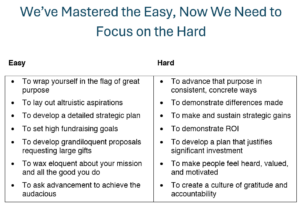The days of easy fundraising are over. Now we need to face up to the hard parts of securing and sustaining philanthropic confidence.
I’m sorry but we’re still a long way off from where we need to be. If you scan advancement literature, conference presentations, and LinkedIn posts, you’ll see there’s still so much focus on getting gifts and so little on earning and sustaining private support. We keep trying to get better at the easy while making too little progress on the hard parts.
Most donors have heard it all. More and more are asking tougher questions and looking for more concrete evidence of organizational relevance, agency, and efficacy if they choose to speak to us at all. More and more are asking for a different arrangement – one in which they are involved or at least consulted well before we come asking for money.
We’re still overly focused on sneaking up on them, not standing up to their best questions; on spiffing up the pitch, not delivering on our mission promise; on trying to wow donors into philanthropic submission, not demonstrating how we intend to improve our services; and on meeting fundraising goals, not building constituent confidence and ever-stronger communities of shared purpose.

Jim Langley is the president of Langley Innovations. Langley Innovations provides a range of services to its clients to help them understand the cultural underpinnings of philanthropy and the psychology of donors and, with that knowledge, to develop the most effective strategies and tactics to build broader and more lasting communities of support. Jim has authored numerous books including his most recent book, The Future of Fundraising: Adapting to New Philanthropic Realities, published by Academic Impressions in 2020.
Related Resources:
- Webinar: 4-Step Process for “Reimagining Fundraising Operations”
- The Power of Building Relationships: Why Donors Need Good Fundraisers
- The Essence of Philanthropy: A Vision That Endures
- Comfort Zones: The Places That Foster the Fullest Expressions of Philanthropy
